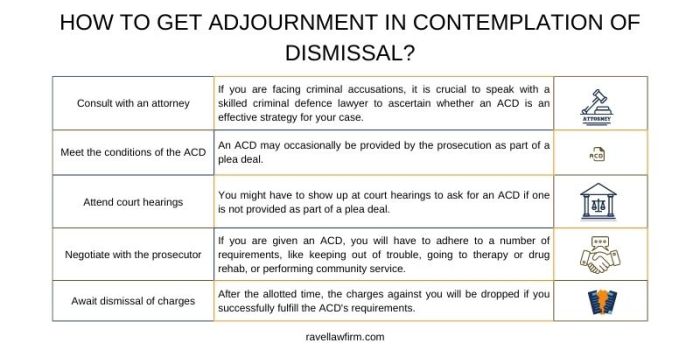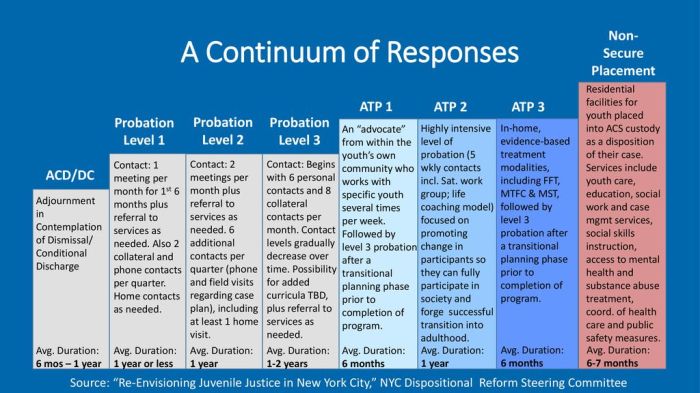ACD adjournment in contemplation of dismissal, a concept prevalent in criminal justice, presents a fascinating subject for exploration. This multifaceted practice, shrouded in legal intricacies, invites us to delve into its nuances, examining its implications and consequences from various perspectives.
As we embark on this journey, we will unravel the intricacies of ACD adjournment, shedding light on its purpose, procedures, and impact on the defendant, victim, and criminal justice system as a whole.
ACD Adjournment in Contemplation of Dismissal

ACD adjournment in contemplation of dismissal is a form of plea agreement in which the prosecution agrees to dismiss the charges against the defendant if the defendant complies with certain conditions during a specified period of time. The defendant does not have to admit guilt, and the charges are not dropped until the end of the adjournment period.
ACD adjournment is often used in cases where the prosecutor believes that the defendant is likely to succeed in completing the conditions of the adjournment and that dismissal of the charges would be in the best interests of justice.
Benefits of ACD Adjournment, Acd adjournment in contemplation of dismissal
- Avoids a criminal conviction
- Provides the defendant with an opportunity to address the underlying issues that led to the charges
- Can help the defendant to avoid jail or prison time
Drawbacks of ACD Adjournment
- The defendant may have to comply with burdensome conditions
- If the defendant violates the conditions of the adjournment, the charges may be reinstated
- The defendant may still have to pay court costs and other fees
Procedures for ACD Adjournment: Acd Adjournment In Contemplation Of Dismissal

The process for obtaining an ACD adjournment typically involves the following steps:
- The defendant and the prosecutor agree to the terms of the adjournment
- The defendant enters a plea of not guilty
- The court approves the adjournment and sets the conditions of the adjournment
- The defendant complies with the conditions of the adjournment
- At the end of the adjournment period, the charges are dismissed
The prosecutor and defense attorney play important roles in the process of obtaining an ACD adjournment. The prosecutor must believe that the defendant is likely to succeed in completing the conditions of the adjournment and that dismissal of the charges would be in the best interests of justice.
The defense attorney must negotiate the terms of the adjournment and ensure that the defendant understands the conditions of the adjournment.
The court will consider a number of factors when deciding whether to grant an ACD adjournment, including:
- The nature of the charges
- The defendant’s criminal history
- The defendant’s likelihood of success in completing the conditions of the adjournment
- The impact of the adjournment on the victim
Conditions of ACD Adjournment
The conditions of an ACD adjournment typically include:
- Probation
- Community service
- Counseling
- Drug or alcohol testing
- Stay away orders
The defendant must comply with all of the conditions of the adjournment in order to have the charges dismissed. If the defendant violates any of the conditions, the charges may be reinstated.
The process for terminating an ACD adjournment typically involves the following steps:
- The defendant files a motion to terminate the adjournment
- The prosecutor responds to the motion
- The court holds a hearing on the motion
- The court grants or denies the motion
Impact of ACD Adjournment

ACD adjournment can have a significant impact on the defendant, the victim, and the criminal justice system.
Impact on the Defendant
- ACD adjournment can help the defendant to avoid a criminal conviction
- ACD adjournment can provide the defendant with an opportunity to address the underlying issues that led to the charges
- ACD adjournment can help the defendant to avoid jail or prison time
Impact on the Victim
- ACD adjournment can allow the victim to have input into the resolution of the case
- ACD adjournment can provide the victim with an opportunity to see the defendant held accountable for their actions
- ACD adjournment can help the victim to move on from the crime
Impact on the Criminal Justice System
- ACD adjournment can help to reduce the number of cases that go to trial
- ACD adjournment can help to save the criminal justice system time and money
- ACD adjournment can help to promote public safety by providing defendants with an opportunity to rehabilitate themselves
Quick FAQs
What is the purpose of ACD adjournment in contemplation of dismissal?
ACD adjournment aims to provide defendants with an opportunity to address underlying issues that may have contributed to their criminal behavior, such as substance abuse or mental health concerns.
What are the benefits of ACD adjournment?
ACD adjournment can offer defendants a chance to avoid a criminal conviction and the associated stigma, while also receiving support and guidance to address their underlying issues.
What are the drawbacks of ACD adjournment?
ACD adjournment may not be appropriate for all defendants, and there is a risk that some individuals may not successfully complete the program, leading to the reinstatement of criminal charges.